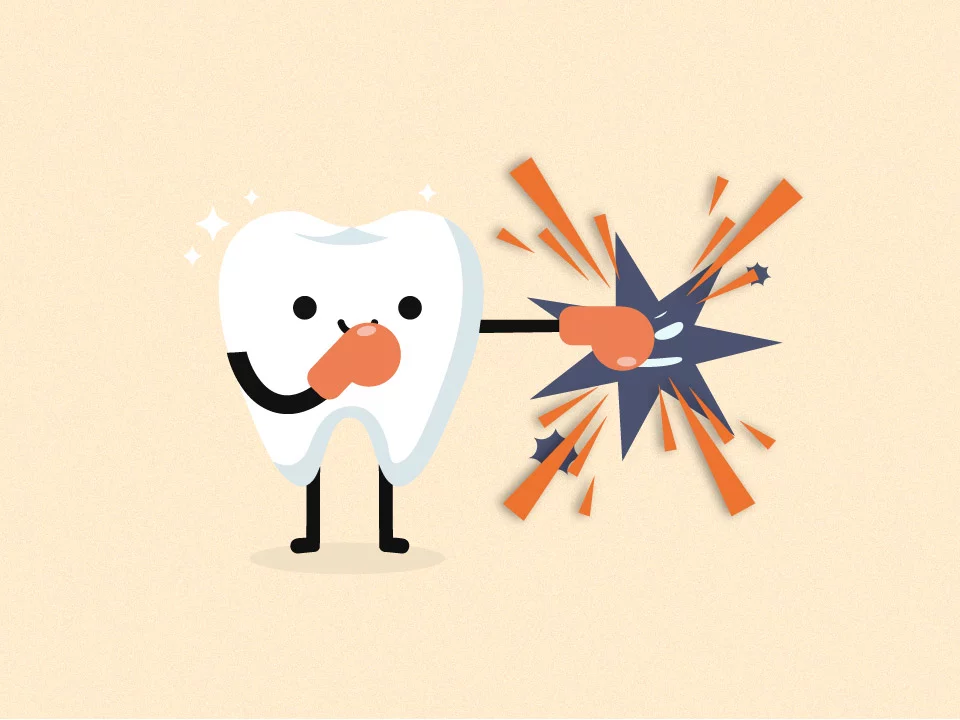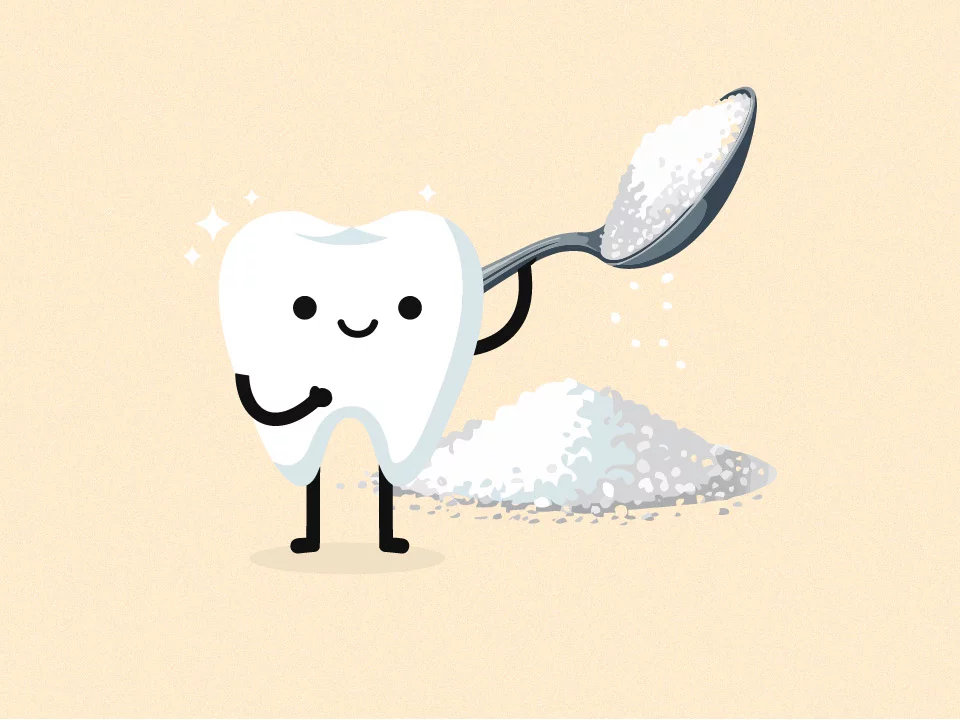Xylitol is a sugar alcohol found in certain plants and fruits. It is recognized for its potential oral health benefits. Xylitol encourages a favorable environment for a process called tooth remineralization and reduces the growth of cariogenic bacteria. Understanding the science behind tooth enamel, the role of saliva and fluoride, and how lifestyle choices affect mineral balance can empower you to make better decisions for your oral hygiene routine and select products that support a healthier mouth.
The Science Behind Teeth Remineralization
How do you remineralize teeth? Teeth remineralization is a natural and continuous process that helps maintain the integrity of the enamel surface of your teeth. Your tooth enamel is the hardest substance in your body, and it is mostly made up of hydroxyapatite — a natural mineral that gives your teeth strength. However, your enamel is still vulnerable to a few threats. The primary threat to your enamel is acid erosion, which occurs when acids dissolve the mineralized tooth structure. This leads to tooth demineralization and potentially white spot lesions, dental caries (cavities), and enamel weakening. [1]
Saliva plays a critical role in preventing permanent damage to your enamel. Saliva is rich in phosphate and calcium ions, which, along with fluoride ions, work to rebuild or “remineralize” the enamel. When minerals are added back to your tooth enamel, they create stronger, acid-resistant layers that help protect your teeth from future damage. This remineralization process balances out the everyday challenges your teeth face from acidic foods and drinks, plaque buildup, and cavity-causing bacteria.
Fluoride toothpaste and fluoride varnishes further enhance this process by delivering fluoride ions directly to the tooth surface. These ions help form a stronger, acid-resistant enamel structure – fluorapatite — that resists demineralization. Saliva, fluoride, and dietary measures work together to remineralize your teeth and help you maintain oral health. [2]

Why Teeth Lose Minerals: Causes of Demineralization
Tooth demineralization and remineralization are both processes that most people deal with over time. Demineralization occurs when the oral environment becomes too acidic. A range of factors contribute to this:
Acidic Foods and Drinks: Consuming citrus fruits, soda, or sports drinks exposes enamel to lower pH levels.
Poor Oral Hygiene: Neglecting brushing and flossing allows dental plaque and biofilm to build up, increasing acid-producing bacteria.
Dry Mouth (Xerostomia): Salivary flow is critical for neutralizing acids and providing the minerals needed for remineralization. Reduced saliva production, often caused by medications or certain health conditions, compromises these protective functions.
High Carbohydrate Diets: Sugars and fermentable carbohydrates feed cariogenic bacteria, leading to increased acid production and more rapid demineralization.
Signs Your Teeth May Need Remineralization
Early signs of enamel weakening can be subtle. White spot lesions, which often appear as chalky or opaque patches on the enamel, are among the first visible signs of demineralization. Additional indications might include:
Increased Sensitivity: Enamel thinning can expose underlying dentin, causing discomfort when consuming hot, cold, or sweet substances.
Visible Changes in Color: Demineralization can affect tooth shade, leading to discoloration.
Rough or Uneven Tooth Surfaces: As enamel thins, surfaces may feel less smooth.
Recognizing these early signs and taking steps to remineralize can prevent more extensive damage, potentially saving you from more invasive dental treatments.

Natural Ways to Support Teeth Remineralization
Remineralizing teeth relies on creating an environment conducive to mineral uptake and incorporation into the enamel. Several lifestyle changes and oral care practices support this balance:
- Consume a Mineral-Rich Diet: Incorporating calcium- and phosphate-rich foods like dairy, leafy greens, and almonds helps provide the building blocks for strong enamel.
- Use Fluoride Toothpaste and Mouth Rinses: Fluoride ions enhance enamel’s resistance to acids and support the remineralization process.
- Maintain Good Oral Hygiene: Regular brushing with a soft-bristled toothbrush and flossing reduce biofilm accumulation, limiting acid exposure and facilitating the integration of minerals back into the tooth structure.
- Stay Hydrated: Adequate saliva flow is essential for buffering acids and delivering minerals. Drinking water and chewing sugar-free, xylitol-containing gum can stimulate saliva production and support remineralization.
- Limit Acidic and Sugary Foods: Reducing your intake of fermentable carbohydrates and acidic beverages can help maintain a more neutral oral pH, minimizing demineralization.
By prioritizing these practices, you understand how to restore tooth enamel naturally and can pave the way for natural remineralization to occur.
Xylitol: What It Is and How It Benefits Oral Health
Xylitol is a naturally occurring sugar alcohol found in certain plants, fruits, and vegetables. It has gained popularity as an artificial sweetener alternative in sugar-free products, especially those aimed at improving oral health. [2] Unlike common sugars that feed cariogenic (decay-causing) bacteria, xylitol does not serve as an energy source for these microorganisms. As a result, the harmful bacteria’s metabolism is disrupted, which lowers acid production in the oral environment.
Xylitol promotes an environment favorable to remineralization by reducing acid and enhancing saliva flow. Saliva production is critical to good oral health; it washes away debris, neutralizes acids, and replenishes lost minerals. Xylitol products can help you maintain a neutral pH in your mouth, which will ultimately discourage further demineralization and support the natural tooth remineralization process.
The Role of Xylitol in Preventing Cavities
Cavities happen when your teeth lose minerals faster than they can repair themselves. Xylitol can help balance things out by:
Stopping Cavity-Causing Bacteria: Xylitol takes away the bacteria’s main food source so they can’t produce as much acid. This slows down or even stops the cavity-forming process.
Helping Your Teeth Rebuild: By reducing acid and boosting your saliva flow, xylitol keeps important minerals like calcium and phosphate available on your tooth surfaces. This helps your teeth repair and stay strong.
Keeping Your Mouth Balanced: When the good bacteria in your mouth outnumber the bad ones, it creates a healthier environment that helps keep your tooth enamel strong and protected.
Incorporating xylitol-containing gums, mints, or remineralizing toothpaste can complement other oral care measures, reinforcing an acid-resistant enamel and supporting long-term oral health.

Xylitol Benefits from a Dental Hygienist
To gain insights from a professional perspective, we consulted Andrew Misak, RDH, a dental hygienist from a Smile Generation Trusted office. [3] Andrew’s clinical experience sheds light on the practical benefits of xylitol and remineralization:
How do you explain the benefits of xylitol to patients? Do you recommend specific xylitol products, such as gum or mints?
Andrew: “When explaining the benefits of xylitol to patients, I highlight its unique properties. Xylitol is one of the few sugars that cavity-causing bacteria cannot metabolize. When these bacteria encounter xylitol, they die, reducing their presence in the mouth. Another significant benefit of xylitol is that it stimulates saliva production. Increased saliva flow helps wash away harmful substances in the mouth and provides essential ions that support the remineralization of enamel, strengthening the teeth over time.
For patients with dry mouth or a high risk of cavities, I frequently recommend products such as XyliMelts and Biotène mouth rinse. XyliMelts, in particular, are highly effective because they are small tabs that adhere to the teeth or gums and slowly dissolve. I suggest patients use them before bed, as they stimulate saliva production throughout the night and continue to reduce bacteria while they sleep.”
What are the most common misconceptions you encounter when educating patients about oral health? Any particularly regarding remineralization and xylitol?
Andrew: “Two common misconceptions I often encounter are:
Fluoride as a poison: Many people misunderstand fluoride’s role in oral health. While excessive levels can be harmful, the controlled use of fluoride in toothpaste, water, and even some foods provides essential protection against cavities.
The disconnect between oral and systemic health: Some patients fail to recognize the critical link between oral health and overall health. Poor oral health has been linked to conditions such as heart disease, diabetes, and pregnancy complications. Educating patients about this connection empowers them to take a more holistic approach to their health.”
Products with Xylitol for Improved Remineralization
Numerous oral care products harness the benefits of xylitol:
Xylitol Gum and Mints: Chewing xylitol gum after meals can help neutralize acids, stimulate saliva, and reduce bacterial adhesion.
Xylitol Toothpaste: Xylitol toothpaste provides a low-cariogenic environment while aiding remineralization when combined with fluoride and other minerals.
Xylitol Mouthwash or Oral Rinses: These solutions can help maintain oral hygiene by reducing plaque biofilm formation and promoting mineral uptake by enamel.
Consistent use of xylitol-containing products, combined with a quality oral hygiene routine, ensures that you keep the oral environment balanced and supportive of ongoing remineralization. Incorporating these products into your daily oral care regimen can complement a balanced diet, regular fluoride application, and professional check-ups.
When to Seek Professional Help for Tooth Decay
While natural remineralization strategies and xylitol-enhanced products can do much to preserve and restore enamel, certain situations require the expertise of a dental professional. If you experience:
Persistent Sensitivity: Ongoing discomfort may indicate deeper enamel erosion or emerging cavities.
Visible Cavities or Dark Spots: Advanced decay often warrants restorative procedures like fillings, crowns, or, in some cases, root canal treatment.
Significant Enamel Erosion: If the damage is extensive, a dentist may recommend advanced interventions, including fluoride varnishes, sealants, or more intensive remineralization products.

Regular dental check-ups and cleanings allow early detection of demineralization and caries. Professional evaluation ensures you receive the most appropriate preventive or restorative measures. Dentists and dental hygienists can also guide you in selecting the right products to enhance mineralization.
Achieving and maintaining a healthy, balanced oral environment is central to preserving tooth structure and preventing tooth decay. Your mouth has a natural way of repairing itself through a process called remineralization. This helps restore lost minerals and strengthen your tooth enamel to protect against acid attacks. Factors like saliva, fluoride, your diet, and good oral hygiene all play a role in this healing process.
Xylitol is especially helpful because it fights the bacteria that cause cavities and encourages your mouth to produce more saliva. This makes xylitol an excellent addition to your overall oral care routine.
By following your dentist’s advice, you can support your enamel and maintain stronger, healthier teeth. Regular check-ups, mindful product choices, and a holistic approach to oral care can ensure that remineralization becomes part of your everyday oral health strategy — one that yields long-term benefits for both your smile and overall well-being.
Find your trusted, local dentist today!
Sources
[1]
Tooth Remineralization Agents: An Evidence-Based Review to Make Informed Patient Recommendations. Today's RDH, n.d., https://www.todaysrdh.com/tooth-remineralization-agents-an-evidence-based-review-to-make-informed-patient-recommendations/. Accessed December 21, 2024.
[2]
Demineralization - Remineralization Dynamics in Teeth and Bone. PubMed Central, U.S. National Library of Medicine, https://pmc.ncbi.nlm.nih.gov/articles/PMC5034904/. Accessed December 21, 2024.
[3]
Andrew Misak. West Covina Dental Group, https://www.westcovinadentalgroup.com/meet-our-team/team-member.andrew-misak-staff-id-39180/. Accessed December 21, 2024.
Smile Generation blog articles are reviewed by a licensed dental professional before publishing. However, we present this information for educational purposes only with the intent to promote readers’ understanding of oral health and oral healthcare treatment options and technology. We do not intend for our blog content to substitute for professional dental care and clinical advice, diagnosis, or treatment planning provided by a licensed dental professional. Smile Generation always recommends seeking the advice of a dentist, physician, or other licensed healthcare professional for a dental or medical condition or treatment.








